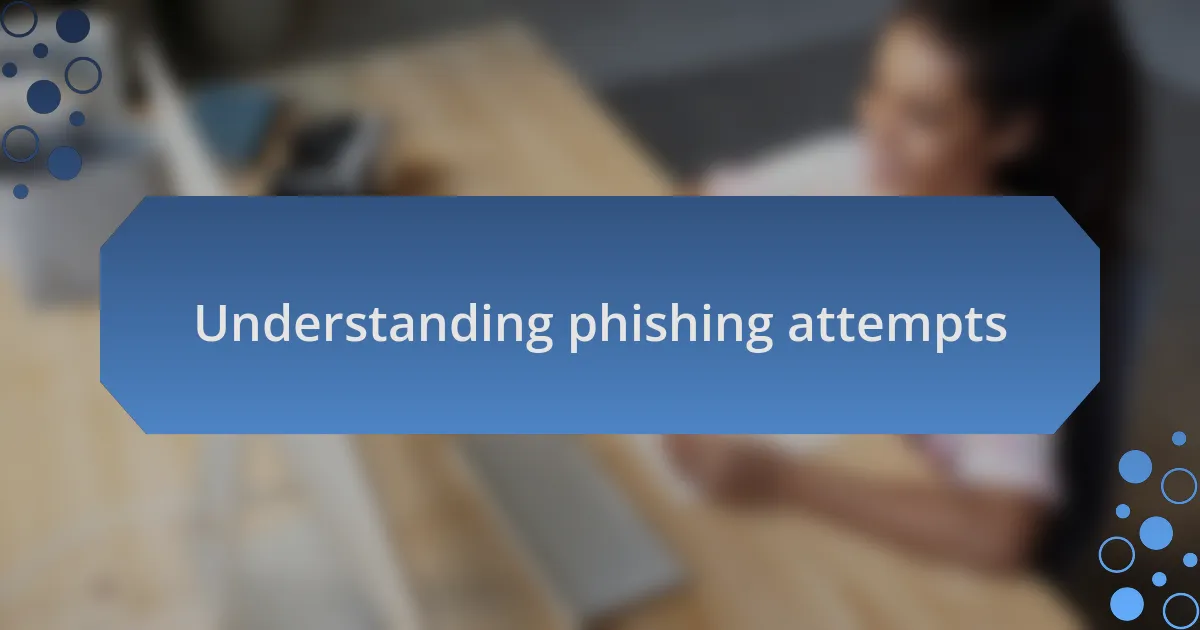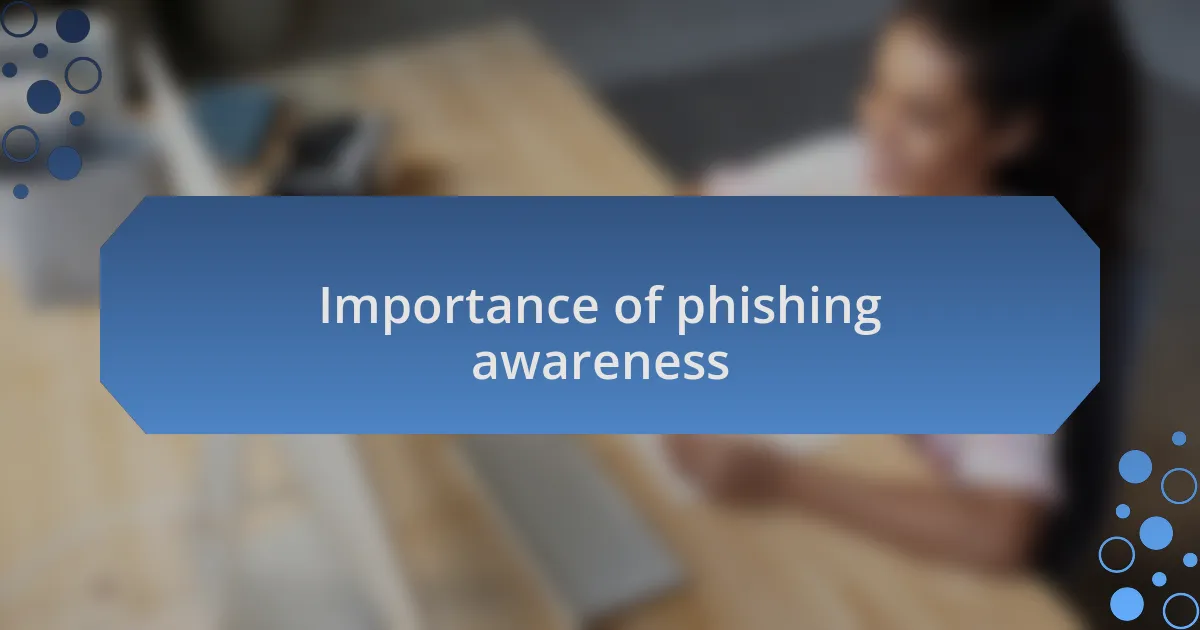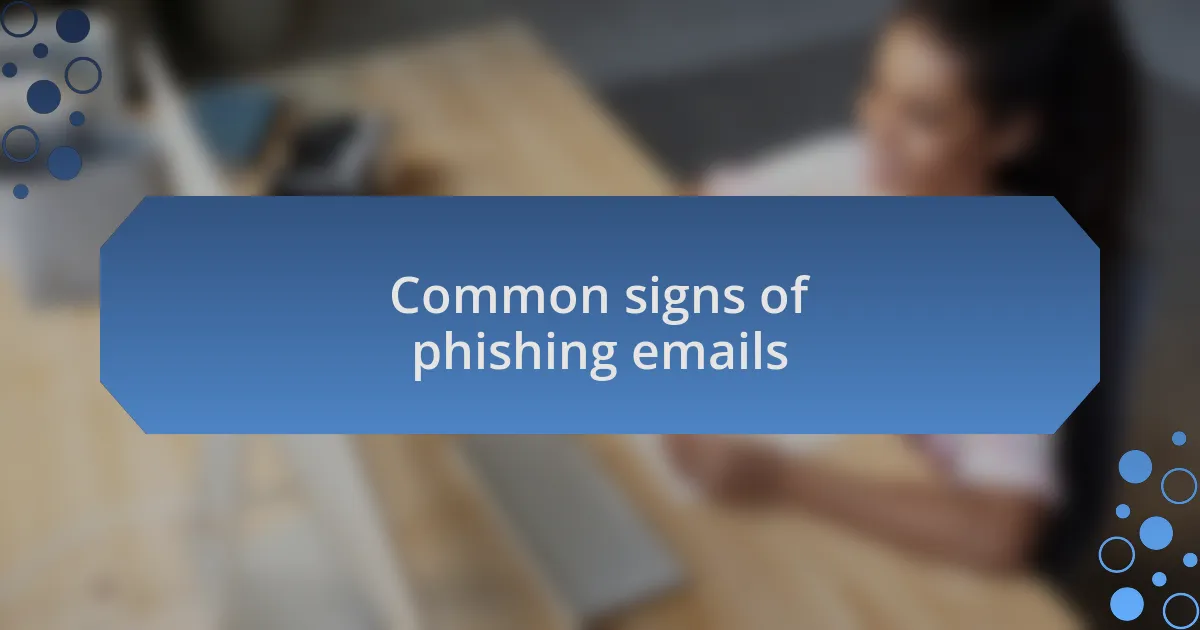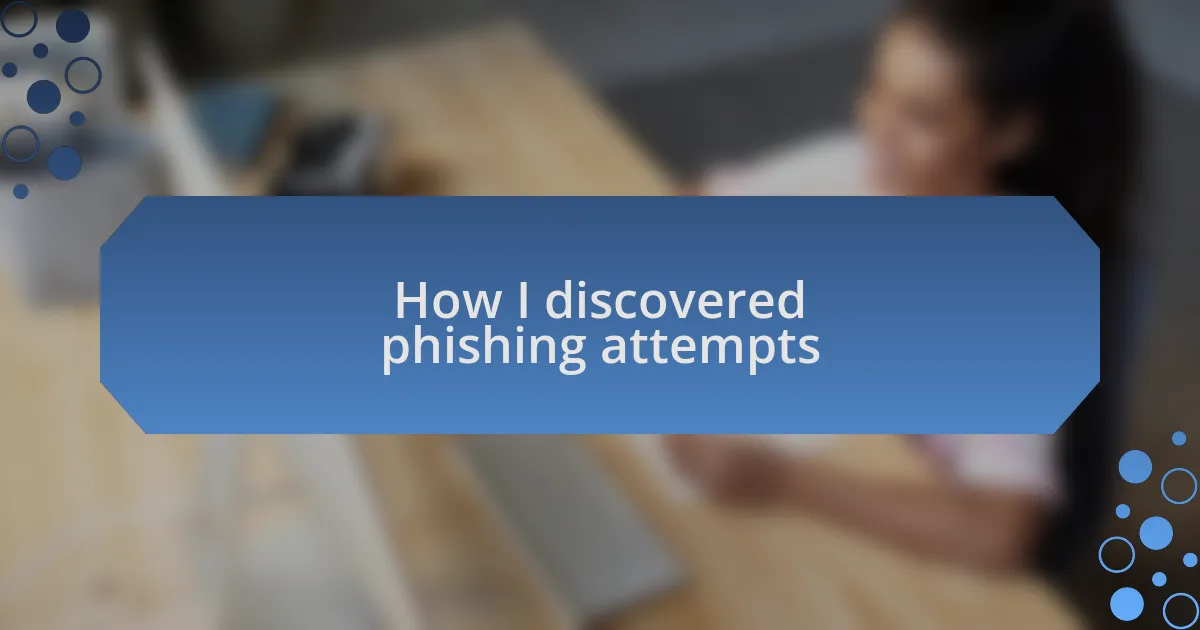Key takeaways:
- Phishing attempts manipulate individuals into revealing sensitive information, often using urgency or fear to create pressure.
- Common signs of phishing emails include poor grammar, urgent tones, and suspicious URLs that do not match the legitimate sender’s domain.
- Building awareness about phishing can empower individuals to recognize threats and inform others, enhancing collective digital safety.
- Instincts and skepticism are crucial in identifying phishing attempts, as trusting oneself can prevent falling victim to scams.

Understanding phishing attempts
Phishing attempts are essentially deceptive tactics used by cybercriminals to manipulate individuals into revealing sensitive information, such as passwords or credit card details. I remember receiving an email that looked almost identical to a legitimate bank notification. My heart raced as I considered what would happen if I clicked the link. It made me realize how easily one can fall prey to such fraud if they aren’t paying close attention.
These scams often play on emotions, creating a sense of urgency or fear. For instance, there was a time when I received a message claiming that my account would be suspended unless I verified my information immediately. I paused for a moment, asking myself: Why would my trusted bank reach out this way? This thought process helped me recognize the red flags in a situation that could have otherwise led me to a precarious situation.
Legitimate organizations typically have established protocols for communication, and they won’t ask for personal details in an unexpected email. Reflecting on my experiences, I now approach emails with a cautious mind, scanning for grammar errors and suspicious links. How often do we overlook these small signs? I’ve learned that a little skepticism can go a long way in protecting oneself from the pervasive threat of phishing.

Importance of phishing awareness
Phishing awareness is crucial because it empowers individuals to recognize and respond appropriately to fraudulent attempts. I recall a time when a colleague nearly fell victim to a “tech support” scam. He received a phone call from someone who sounded credible, urging him to install software to fix an urgent problem. Fortunately, his instincts kicked in, and he decided to verify the source before taking any action. This experience highlighted for me how quickly a simple phone call can turn into a vulnerability if one isn’t cautious.
Understanding the importance of phishing awareness also means appreciating the broader implications of these attacks. Imagine the collective impact if more people were educated about these threats. I often think about the shared responsibility we have in digital communities. While protecting our own information is vital, we also have a duty to inform others. Have you ever considered how sharing your experiences could prevent someone else from getting duped? By spreading awareness, we create a stronger defense against cybercriminals.
Moreover, staying informed about phishing tactics helps build a proactive mindset. I’ve made it a habit to stay updated on emerging scams. Reflecting on just how fast these tactics evolve encourages me to remain vigilant. When I see new phishing schemes in the news, I reinforce my security measures. This practice not only protects my data but also fosters a sense of confidence in navigating the digital landscape. How prepared are you to identify a phishing attempt? Being aware is more than just knowing; it’s a call to action.

Common signs of phishing emails
When examining phishing emails, there are several telltale signs that can raise red flags. One common indicator I’ve encountered is poor spelling and grammar. I recall receiving an email that claimed to be from my bank, but the numerous mistakes made me reconsider its authenticity. It made me wonder how a professional organization could send such unprofessional communication.
Another prevalent sign is the urgency conveyed in the email’s tone. I once received a message urging me to “act now” to secure my account, warning that failure to do so would lead to suspension. It struck me as a tactic designed to provoke fear rather than provide genuine assistance. This type of pressure can easily cloud judgment, making it crucial for all of us to take a step back and assess the situation calmly.
Lastly, hovering over links without clicking often reveals suspicious URLs that don’t match the purported sender’s domain. I vividly remember a phishing attempt where the link masqueraded as a well-known delivery service. The slight changes in spelling gave it away, prompting me to dig deeper instead of hastily clicking. Have you ever checked a link only to find that it didn’t lead where you thought it would? This simple act of curiosity can save us from falling into traps.

How I discovered phishing attempts
It was during a regular day of checking my emails when I first stumbled upon a phishing attempt. The subject line seemed harmless, but as I read through the message, something unsettling nagged at me. I recall feeling a knot in my stomach as I noticed the sender’s email address; it was slightly misspelled compared to my actual bank’s email, something I hadn’t seen before. Why would a legitimate institution use such a confusing alias?
Then there was the day I received an email that offered an unbelievable deal on software I had been wanting. While the offer was tempting, something felt off, as though the universe was urging me to pause. I couldn’t shake the feeling of skepticism. Despite the professional-style formatting and imagery, the language felt overly familiar, almost too good to be true. It made me consider how our desire for a good deal could blind us to the very real risks lurking in our inboxes.
Another memorable moment happened when I noticed an email attachment that seemed unusual. It was labeled as an invoice, but I never requested any such document. Curiosity got the better of me as I hovered over the attachment, and my heart raced when I saw the file type—.exe. My instincts screamed at me to delete it immediately. Have you ever felt that rush when you realize you might have narrowly avoided a mistake? Trusting my gut that day reinforced my belief: always question what seems too familiar or urgent.